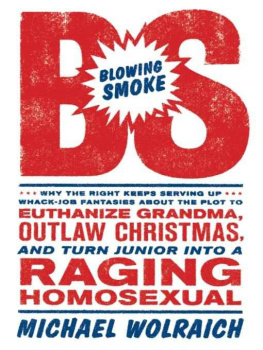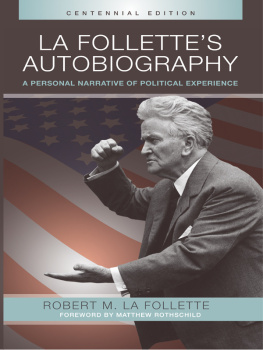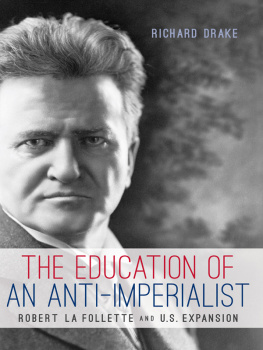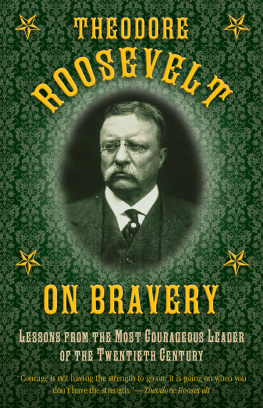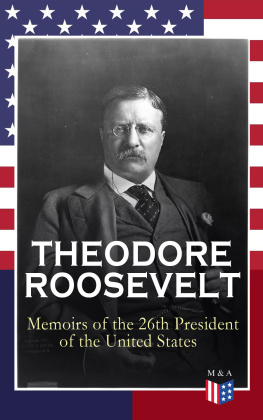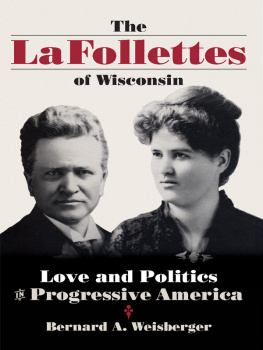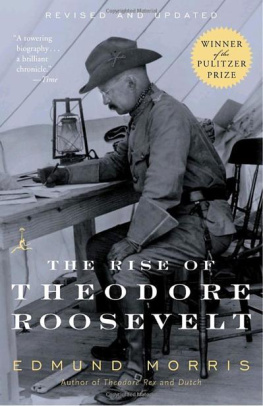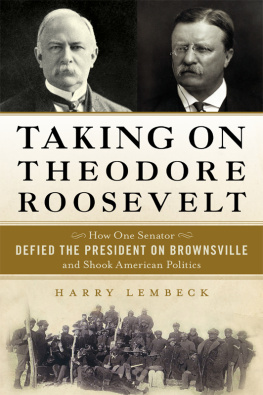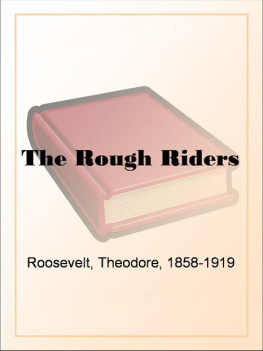UNREASONABLE MEN
UNREASONABLE MEN
THEODORE ROOSEVELT AND THE REPUBLICAN REBELS WHO CREATED PROGRESSIVE POLITICS
MICHAEL WOLRAICH


UNREASONABLE MEN
Copyright Michael Wolraich, 2014.
All rights reserved.
First published in 2014 by
PALGRAVE MACMILLAN
in the United Statesa division of St. Martins Press LLC,
175 Fifth Avenue, New York, NY 10010.
Where this book is distributed in the UK, Europe and the rest of the world, this is by Palgrave Macmillan, a division of Macmillan Publishers Limited, registered in England, company number 785998, of Houndmills, Basingstoke, Hampshire RG21 6XS.
Palgrave Macmillan is the global academic imprint of the above companies and has companies and representatives throughout the world.
Palgrave and Macmillan are registered trademarks in the United States, the United Kingdom, Europe and other countries.
ISBN: 9780230342231
Library of Congress Cataloging-in-Publication Data:
Wolraich, Michael.
Unreasonable men : Theodore Roosevelt and the Republican rebels who created progressive politics / Michael Wolraich.
pages cm
Includes bibliographical references.
ISBN 9780230342231 (alk. paper)
1. United StatesPolitics and government18651933. 2. Progressivism (United States politics)History20th century. 3. Republican Party (U.S. : 1854 )History20th century. 4. Roosevelt, Theodore, 18581919. 5. La Follette, Robert M. (Robert Marion), 18551925. 6. Cannon, Joseph Gurney, 18361926. I. Title. II. Title: Theodore Roosevelt and the Republican rebels who created progressive politics.
E661.W65 2014
973.911092dc23 2013047104
A catalogue record of the book is available from the British Library.
Design by Newgen Knowledge Works (P) Ltd., Chennai, India.
First edition: July 2014
10 9 8 7 6 5 4 3 2 1
Printed in the United States of America.
For Tanya, all the way through
The reasonable man adapts himself to the world: the unreasonable one persists in trying to adapt the world to himself. Therefore all progress depends on the unreasonable man.
George Bernard Shaw, 1903
CONTENTS
PREFACE
AT THE DAWN OF THE TWENTIETH CENTURY, AMERICA WAS IN CRISIS. THE GAP BETWEEN RICH and poor was growing. Natural resources were dwindling. Unregulated financial markets regularly succumbed to spectacular crashes. Workers labored long hours under hazardous conditions yet barely earned enough to get by.
Despite widespread discontent, congressional paralysis prevented the government from meeting the nations challenges. Republican obstructionists maintained a chokehold on the House and Senate, blocking all but the most meager reform bills. The Democrats, weak and divided, had no hope of breaking their grip. Both parties catered to large corporations that lavished them with funding.
As the publics fury intensified, two unconventional Republican leaders tried to reform their own party and heal the country.
President Theodore Roosevelt was the pragmatist. He pushed for change one small step at a time. When congressional leaders wouldnt give him the legislation he wanted, he negotiated and compromised to get the best he could, operating under the premise that half a loaf is better than no loaf. Nothing of value is to be expected from ceaseless agitation for radical and extreme legislation, he insisted.
Senator Robert Marion La Follette was the insurgent. Fighting Bob from Wisconsin never settled for half a loaf. He championed ambitious reforms that stood no chance of passing and refused to compromise with his Republican colleagues. When they voted down his bills, he went to their districts and campaigned against them in Republican primaries. Real progress would not be possible, he believed, until voters threw the obstructionists out of office.
Though Roosevelt and La Follette shared the same goals, they were never able to work together. Politically, their tactics were incompatible. Personally, they held each other in contempt. Their ferocious battle against the Republican establishmentand ultimately against each othertraumatized the country and nearly destroyed the party, but it finally broke down the barricades that had immobilized Congress. A new political movement rose from the flames and triggered one of the greatest explosions of change in US history: income taxes, labor law, womens suffrage, campaign finance reform, environmentalism, industrial regulation, the Federal Reserve, and other reforms that define modern America.
With these changes, a new conflict emerged. The old North-South rivalry that had divided the country since the colonial era began to slip into the background. New battle lines, ideological rather than regional, cut across American politics. Those who identified with Roosevelt or La Follette called themselves progressives. Those who opposed their agenda of reform called themselves conservatives.
A century later, we hear their echoes in our contemporary political battles. The protestors who occupied Wall Street and railed against the capitalists took their words from Fighting Bob, though few of them knew it. Tea Party rebels repeat the laissez-faire rationales of long-dead Republican leaders while employing La Follettes tenacious grassroots tactics in their insurgency against the Republican establishment.
I wrote this book to explain how it all began. By returning to the moment when America broke into two ideological factions, we can see more clearly what were fighting about and better appreciate the stakes.
But clarity is not my only objective. History offers a solution to our modern political dysfunction. The first progressives bequeathed us a case study in how to reform a broken system. Theodore Roosevelt exemplified conciliation and incremental change. Under the right circumstances, his pragmatic approach has obvious advantages, but it failed to achieve much progress in the face of entrenched opposition. Eventually even Roosevelt abandoned incrementalism. Three years after his presidency, he reinvented himself as the bellicose Bull Moose, embraced La Follettes radical proposals, and assailed the conservative politicians with whom he had once cooperated.
By then, the progressive movement was in full swing, driven forward by La Follette and his little band of Republican insurgents. Their defiant, quixotic, unreasonable insurgency against their own party inspired voters nationwide and catalyzed a historic political realignment that decimated the obstructionists in Congress and opened the floodgates to reform. A century later, La Follette and his allies have left us a rich legislative legacy and a timeless lesson in practical politics: to build momentum, it is often necessary to lose in order to win.
THE BOLT
Oh, pshaw! It seems to be coming about that this country is divided into two partsthe republic of the United States and Wisconsin.
Uncle Joe
MADISON, WISCONSIN, MAY 18, 1904
Even without the barbed wire, the old brick gymnasium looked like a fortress. A fat red turret squatted at each corner of the building; six slender ones overlooked the parapets and gables. The huge wooden doors that sealed the entrances were tall enough for giants and studded with nails. Standing at the edge of a broad blue lake, the Red Gym seemed sturdy enough to protect the University of Wisconsin from Vikings, sea monsters, and other menaces.
Politicians were another matter. They stormed the gymnasium by land one sunny spring day in 1904. Lightly armored in straw skimmer hats and convention badges, the Stalwarts advanced toward the citadel, hoping to overwhelm the enemy by force of numbers. Curious housewives stepped out in their aprons to watch them march down the road, four abreast waving two large American flags.
Next page

